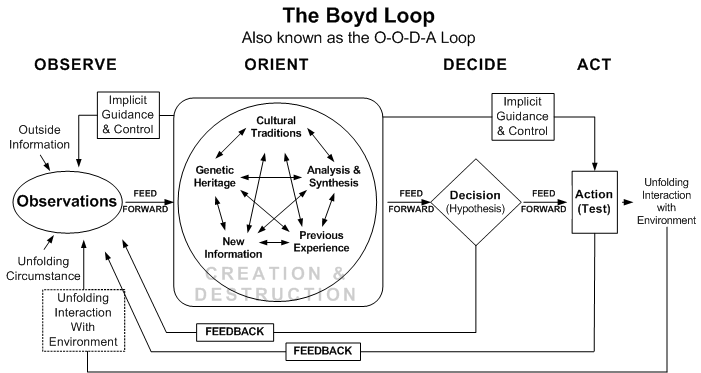For chess master Lasker the game was a struggle
It has been said that Lasker, doctor of mathematics and grand master of chess, once observed a predatory insect attack, kill and eat another insect, which got him to ponder if there might exist, or could be designed, a creature, a macheoid, that would always be victorious. That creature would, in such a case, need a superior strategy.
Three quarter of a century later John R. Boyd had studied 2500 years of human conflict and found that decisive for the outcome of the fight was the ability to observation, orientation, decision, and action, quicker than the adversary. The result is generic and applies to all systems: an individual, a project group, product developing company, or a nation.
Decide
Based on a hypothesis of reality and probable development, we make decisions, that will affect the very reality that we observe.
Act
Our actions influences, alters, the observed reality and thereby what we observe. The orientation influences action, the realization of the decision, since our way of action depends on the same factors as our orientation: earlier experiences, cultural traditions, etc. We are for the most part unaware of these mostly unconscious influences.
To become aware of the influences is to some extent to know one´s enemy and to know oneself in the spirit of Sun Tzu.
Friction & fog
According to Carl von Clausewitz, the only thing that separates war on paper from war in reality was friction. By friction in war, Clausewitz meant all uncertainty and small mistakes and unpredictable errors that accumulates and can sum up to insurmountable barriers.
Clausewitz also spoke of the fog of war (imagine the poor visibility at the battle field, due to all the black powder smoke), which is the uncertainty and incompleteness of the information on which decisions are based.
Friction plays a major part in the Boyd-loop of an organization. The challenge is to reduce friction on your side, and by diverse measures increase friction in your adversary´s organization. If you succeed really well, it might happen that your adversary's ability breaks down completely.
In product development there is often a high degree of both friction and information fog. The management of product development projects is very much about handling these difficulties.



